Disclosure Scotland fees - discounting waivers and accredited bodies: consultation analysis
Outlines the key themes from analysis of responses to a public consultation on options for Disclosure Scotland’s approach to fee discounting, including the fee waiver for volunteers, and organisational registration subscriptions (accredited body fees).
Analysis of responses received
The overarching theme throughout all responses suggests that charging fees for disclosures, particularly PVG disclosures, may put people off applying for regulated roles. This was focused primarily on volunteers in regulated roles.
Discount for people in receipt of certain benefits
Disclosure Scotland has never taken an income-based approach to setting fees. However, with the potential of increased fees, we gathered views on providing more support on disclosure fees to people at greatest socioeconomic disadvantage.
Respondents were asked to consider a fee discount structure based on the person being in receipt of certain benefits including, income-based jobseeker’s allowance, universal credit, personal independence payment and adult disability payment.
The proposed discount was a 50% reduction for the full fee for people in receipt of the qualifying benefits.
Question 1 – Do you agree with the proposal to create a fee discount structure for people in receipt of certain benefits?
There were 824 responses to this part of the question.
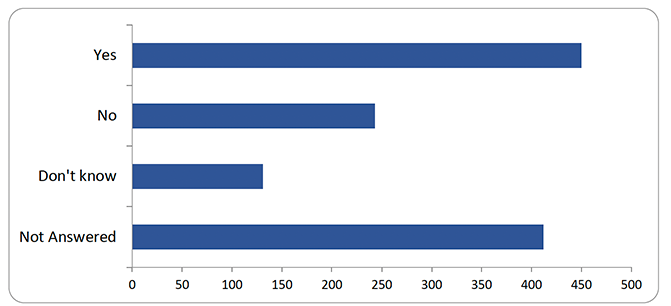
| Option | Total | Percent |
|---|---|---|
| Yes | 450 | 36.41% |
| No | 243 | 19.66% |
| Don't know | 131 | 10.60% |
| Not Answered | 412 | 33.33% |
Question 2 – What information do you think we need to consider when looking at a fee discount for people in receipt of certain benefits?
There were 681 responses to this part of the question.
Analysts noted that there was a high level of misunderstanding around this proposal. Amongst those who provided a response here, 132 respondents indicated that they were answering only in relation to fees for volunteers or expressed a belief that the PVG scheme only applied to people in volunteering and not those in paid work.
Respondents who agreed with the proposal of a fee discount for people in receipt of certain benefits typically mentioned the same key themes and concerns as respondents who disagreed with it.
There were a number who noted the difficulty on organisations or the Government of administering a programme of discounting and this would likely outweigh the benefits on an individual level.
Some respondents specifically stated that checking benefit claimant status must sit with Disclosure Scotland, not the accredited body to prevent administrative burden across accredited bodies and to protect individual privacy. Respondents raised a related theme around privacy that proving receipt of benefits could be viewed as intrusive or put people off applying.
Crossreach said:
You should consider if people will be willing to disclose this information. Would that mean that they would not apply or rather pay the non discount fee rather than inform people that they are on benefits. The question arises of how and who would be carrying out the checking the documents. Who would be responsible for ensuring that the correct identification of the documents, what documents would require to be submitted and would they be certain time validity parameters on these.
Children's Hospices Across Scotland (CHAS) similarly raised that:
We support the principle of reducing barriers for people in receipt of benefits, but have misgivings about how this would operate in practice. CHAS covers the costs of disclosures for all staff members. Were fees – albeit discounted fees - to be introduced for volunteers doing regulated roles in QVOs, CHAS would be likely to cover these costs also. With that in mind, in order to take up the proposed discounted rate, CHAS would need to ask prospective staff and volunteers for information about their receipt of benefits in order for the fee discount to apply. This is sensitive information, that could potentially be regarded as invasive and off-putting for potential staff and / or volunteers.
As views were specifically sought on whether there were benefits or circumstances that required further consideration in this area, a range of responses on this topic were provided including:
- in receipt of state pension
- young people who do not receive a personal benefit but are in a family where the benefit is received
- receiving any UK or Scottish benefit
- receiving Carer’s Allowance
- receiving contributions-based or New Style Jobseeker’s Allowance
- students
- people on minimum wage
Some respondents also asked if the PVG scheme could support payment in different ways, such as part-time staff being charged a different fee from full-time staff, by income bands or paying in instalments e.g. by direct debit.
In response to this question, a large group of respondents opposed to the proposal believed that the government provides enough support and it should be on either the individual or their employer to absorb the cost. This group tended to be concerned about the cost to the taxpayer or those paying full price for disclosures subsidising discounted disclosures. Some respondents noted that as government support was already available to people in receipt of benefits, further measures were unfair to those not eligible.
Within a small group of respondents who believed that the law should specify whether payment should be made by the employer or individual, around half expressed that payment should always be made by the employer.
Furthermore, a large amount of respondents gave views that if the proposal to go ahead with a discount (rather than full fee waiver) for volunteers is taken, there should be a full fee waiver provided to volunteers in receipt of benefits.
Discount for care experienced young people
Disclosure Scotland is considering providing a 50% fee discount to young people with experience of care. Respondents were asked to give their views on the proposal generally and two options within that proposal.
Option 1: In this proposal, Disclosure Scotland suggest defining a young people with experience of care as a person who is over 16 years of age but under 26 years of age, has been looked after by a local authority at any time from their sixteenth birthday onwards and who is no longer looked after by a local authority. This option has a narrower eligibility than Option 2 on the basis that a young people with experience of care in this position is even more vulnerable to financial hardship due to lack of familial support and upheaval in later childhood than a broader group of people and therefore at a minimum targeted support should be made available to this group.
Option 2: Disclosure Scotland is considering providing a 50% fee discount for young people with experience of care. Eligibility under this option would mirror the criteria for the Care Experienced Student Bursary, meaning the young person must be aged between 16 and 25 years and have been looked after under one of the following arrangements:
- foster care
- kinship care (arranged by a local authority)
- kinship care (not arranged by a local authority but where engagement/contact with local authority or social work existed during the arrangement)
- looked after at home or looked after away from home under a Compulsory Supervision Order
- residential care
This option has a broader eligibility in recognition that care experience is a lifelong issue and that a wider support package would bring more benefits to young people with experience of care.
It is noted that since the consultation was published, eligibility for the Care Experienced Student Bursary has widened to not include an age limit.
Question 3 – Do you agree with the Option 1 proposal to provide a fee discount for care experienced young people?
There were 765 responses to this question.
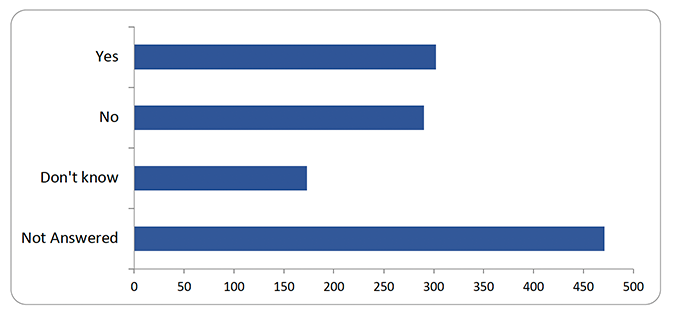
| Option | Total | Percent |
|---|---|---|
| Yes | 302 | 24.43% |
| No | 290 | 23.46% |
| Don't know | 173 | 14.00% |
| Not Answered | 471 | 38.11% |
Question 4 – Do you agree with the Option 2 proposal to provide a fee discount for care experienced young people?
There were 767 responses to this question.
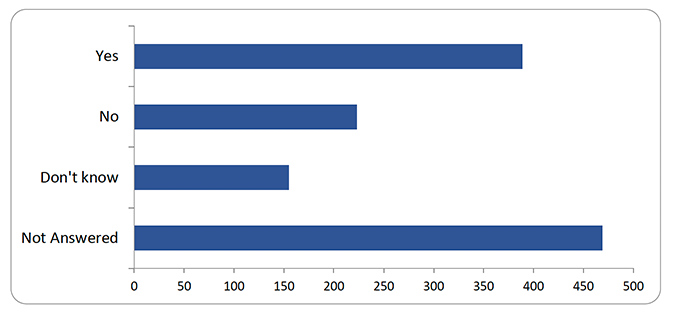
| Option | Total | Percent |
|---|---|---|
| Yes | 389 | 31.47% |
| No | 223 | 18.04% |
| Don't know | 155 | 12.54% |
| Not Answered | 469 | 37.94% |
Question 5 – What information do you think we need to consider when proposing a fee discount for care experienced young people?
There were 595 responses to this question.
Analysts noted that there was a high level of misunderstanding around this proposal. Amongst those who provided a response here, 101 respondents indicated that they were answering only in relation to fees for volunteers or expressed a belief that the PVG scheme only applied to people in volunteering and not those in paid work.
Of those who expressed a preference for Option 1 or Option 2, 50 respondents preferred the broader eligibility in Option 2 and only seven preferred the narrower eligibility in Option 1.
Responses which were supportive of discounting tended to focus on practical concerns, such as ensuring the administrative process of providing a discount did not extend the period before a person with experience of care could receive their disclosure or protecting their privacy from employers being made aware that they accessed a discounted disclosure.
Some respondents also expressed concerns that uptake would be low due to the requirement to disclose someone’s care experience history.
The Community Brokerage Network said that:
A consideration may also be that a young person may not want to share the fact they are care experienced with their employer which may present a barrier for some young people to apply for the discount.
The Roman Catholic Diocese of Paisley - Scotland also shared that:
We agree with the principle of providing a discount for care experienced young people but have significant concern regarding the ethics of this in relation to trauma informed practice. The consultation information demonstrates an awareness of the additional barriers to work opportunities faced by care experienced young people but does not appear to recognise the re-traumatisation experienced if such young people have to disclose and provide evidence of their care experience. This will require careful consideration in its implementation.
Partners in Advocacy made a similar point around difficulty obtaining formal documentation:
Careful attention must be given to the logistical aspects of implementing this initiative, especially regarding individuals from care backgrounds who may lack formal documentation of their experiences, such as those in kinship care arrangements.
Aberdeen Council of Voluntary Organisations provided a collective response on behalf of their involved organisations to say that they were not sure whether to support the proposal. While supportive generally of additional measures for people with experience of care, their concerns were that the PVG scheme was not the right area to put support in place:
We welcome any support to care experienced young people, and are committed to The Promise but are not convinced the PVG system is the most effective or appropriate method to do this. We believe this would further stigmatise care experienced people by forcing them to disclose information about their personal circumstances and often complex home life.
Analysts further identified that while only a small number of responses mentioned life long support, they were from organisations identified as working directly with people with experience of care. Who Cares? Scotland, the national independent membership organisation for care experienced people, noted the importance of an inclusive definition that did not exclude people who were care experienced but not ‘care leavers’ and that provided support well into adulthood. They provided detailed feedback, including that:
Who Cares? Scotland set up a National Advocacy Helpline during the pandemic to be able to meet the advocacy needs of all Care Experienced people, regardless of their age or local authority. Due to the demand for this service, the helpline has become a permanent offer of assistance and is able to operate due to the support of volunteers. Most callers to our National Advocacy Helpline are over the age of 26 and call regarding financial difficulties. This highlights the need to consider what more Corporate Parents and other organisations can do to support our Care Experienced people facing challenges who have aged out of current statutory support.
They noted they would support broader eligibility that includes those who have been adopted, are in informal kinship care, looked after at home, and those in secure care. Respondents working with people with experience of care also tended to support a higher discount or full fee waiver for people with experience of care.
Respondents opposed to discounting for young people with experience of care believed there was adequate support for this group through existing government measures and that any spend that would be applied to providing this discount for this group of people only should be applied to a reduction in fees universally.
A small number responded with a view that consideration should be given to discounting for all young people or for students. There was a mix of views on whether this should be instead of or in addition to young people with experience of care.
79 respondents gave views that if the proposal to go ahead with a discount (rather than full fee waiver) for volunteers is taken, there should be a full fee waiver provided to volunteers who have experience of care.
Discount for volunteers
Since 2011, Disclosure Scotland has covered the cost of PVG scheme disclosures for any applications relating to regulated work in a voluntary and unpaid capacity for a Qualifying Voluntary Organisation (QVO). As part of this consultation Disclosure Scotland considered the operation of the QVO fee waiver to ensure public money is being used effectively.
Respondents were asked to consider the impact of moving to a fee discount model for volunteers in QVOs.
Question 6 – Do you agree with the proposal to move to a fee discount for volunteers in Qualifying Voluntary Organisations?
There were 1199 responses to this question.
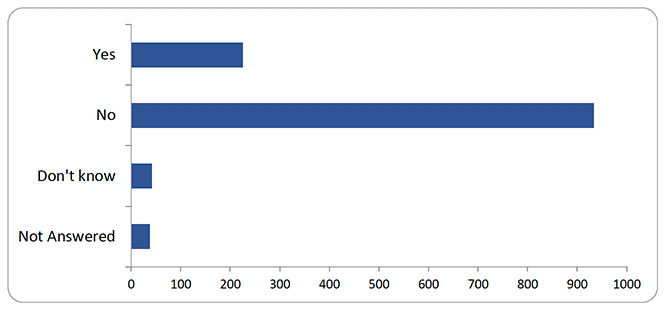
| Option | Total | Percent |
|---|---|---|
| Yes | 225 | 18.20% |
| No | 933 | 75.49% |
| Don't know | 41 | 3.32% |
| Not Answered | 37 | 2.99% |
Analysts noted that there was some criticism of the framing of this question. A small number of those who responded ‘Yes’ indicated a preference under Question 7 for retaining a full fee waiver. For the purposes of overall analysis of this question, these responses have been taken as a ‘No’ response. The Scottish Government has never made a proposal to remove discounting altogether. Question 7 – What information do you think we need to consider when proposing moving to a fee discount for volunteers in Qualifying Voluntary Organisations?
There were 1164 responses to this question.
Responses broadly focused on:
- the savings to the Disclosure Scotland budget requirements does not justify the contribution made by volunteers in these roles
- asking volunteers in regulated roles to pay for scheme membership will contribute to a further downwards trend in volunteering
- risk of closure or reduction in services for groups reliant on volunteers
- risk of exacerbating child poverty and life opportunities as volunteer-run or supported children’s clubs and sports activities close gaps in provision of childcare and provide positive community spaces for children who may not otherwise have access
The recurring theme from consultation and in-person engagement was that introducing a fee on volunteers in QVOs indicated the Scottish Government devaluing the work of volunteers in this sector and acted in opposition to the Scottish Government’s Volunteering Action Plan, which promotes the value of volunteers and the importance of organisations covering out-of-pocket expenses for volunteers.
Volunteer Edinburgh provided a response on behalf of 13 current Qualifying Voluntary Organisations, delivering a range of community services for children and families, homeless people (and those at risk of homelessness), people involved in the criminal justice system, older people, individuals with mental health and substance misuse issues. Services include befriending, listening, care and support, outdoor and practical activities.
They expressed that the current full fee waiver is “clear, effective and workable, promoting inclusion and simplicity in access to volunteering” and that a move to a partial discount would have several negative impacts on individuals volunteering, organisations and service users. They noted in their concluding comments:
The introduction of PVG fees for volunteers necessitates a careful review of potential impacts and strategies to mitigate adverse effects on volunteer inclusivity, quality of services and organisational operations. It contradicts all government commitments to equality, fairness and inclusion in volunteering. It is crucial to consider both immediate financial challenges and long-term consequences on public services and community engagement.
The Govan Community Project noted that the current fee waiver has a positive impact in enabling volunteering in their sector:
It has been of a vast help to us as a charity that the one cost we don't have is PVG disclosure as this means money can be used in the actual project delivery in caring, supporting and enabling people to have a better life in Glasgow.
Similarly, Chest Heart & Stroke Scotland noted the positive impact from the fee waiver and additional services from Disclosure Scotland, and that reduction or removal of these would be “devastating” in the third sector:
We are grateful for the service, support and guidance from Disclosure Scotland as PVG and Disclosure checks play a vital role in safeguarding CHSS service users, colleagues and volunteers, by building an environment which actively prevents harm and deters unsuitable individuals who may target charities to gain access to vulnerable people. The current fee waiver for volunteer PVG applications has enabled CHSS to safely recruit the thousands of volunteers across Scotland who gift their time and share their unique skills and expertise, to support the 1 in 5 people in Scotland living with chest, heart and stroke conditions and Long Covid live their lives to the full. The proposal to remove this fee waiver will place a huge financial burden on voluntary organisations and act as a barrier to sustaining volunteering and welcoming new volunteers. These proposals come on top of existing pressures on the voluntary sector. The cumulative impacts of the pandemic and cost of living crisis have led to a rapid decline in formal volunteering. The number of adults in Scotland volunteering for an organisation or community group has fallen below 1 million for the first time in 15 years (Scottish Household Survey, 2022). The proposals will also act as a barrier to the delivery of the Scottish Government’s Volunteering Action Plan which sets out a goal to ‘reduce the barriers to participation’ and ensure that ‘the places and spaces where we volunteer are developed, supported and sustained’.
Volunteer Scotland provided a response based on collective views gathered through their Policy Champions Network:
In the Policy Champions Network survey, 79% of respondents felt that the proposal would have a negative impact on their organisation or the organisations they represent. This is largely because the vast majority of volunteer involving organisations take steps to ensure that volunteers are not out of pocket because of their volunteering. This is in alignment with the Volunteer Charter, which sets out 10 principles for sustainable and legitimate volunteering including that ‘no one should be prevented from volunteering due to their income’. 65% of respondents to the PCN survey stated that they would absorb the new discounted PVG fees for volunteers. None said that they would ask volunteers to absorb the cost, but 24% said that they ‘didn’t know’. As a result, this proposal could have significant financial implications for many organisations. We estimate that the total potential cost of this proposal for qualifying voluntary organisations is just under £1 million.
This aligns with the responses to the consultation on potential widespread negative impact, with around 75% of respondents opposed to the proposal to move to a discount.
They also noted a theme that emerged in Disclosure Scotland’s engagement events that there was a risk in reducing the flexibility in recruiting volunteers for organisations absorbing the cost, as they may have to make decisions to take on people who could commit more time to get value for money on the cost:
One attendee of the PCN consultation event also highlighted that this proposal could change the type of volunteering roles organisations recruit to, making volunteering less flexible and inclusive. She stated that: “I can just see that if you're having to make choices, you're going to make the choice of paying for the PVG for the person who can give a year as opposed to the person who can give six weeks, which again will then just narrow down the people getting the experience” Much of the recent evidence on volunteer needs and preferences has suggested that many volunteers would prefer more flexibility in their volunteering roles to ensure that it fits in with other commitments. In the most recent Time Well Spent survey, 51% of prospective volunteers in Scotland stated that they would ‘like to dip in and out of volunteering activities’ and 48% stated that they would ‘like to be able to carry out volunteering at a time and/or place of their choosing’. Similarly, 30% of non-volunteers in Scotland stated that they are not volunteering because they ‘don't want to make an ongoing commitment’.
Scouts Scotland provided a similarly detailed response on organisational and wider sector impact. They also noted that there was a risk in needing to take on fewer volunteers, excluding those who could provide less time commitments. They commented on the impact of moving to a fee discount in Scotland when a fee waiver is retained in other parts of the UK:
It would effectively introduce a two-tier system between Scotland and the wider UK that puts the pipeline of volunteers that Scouting in Scotland relies on at risk. This could result in Scouting in Scotland, and Scotland’s wider youth sector, lagging behind the UK’s other nations in terms of both impact and economic contribution as fewer people volunteer, and those that do are forced to pick and choose between opportunities due the cost of multiple PVGs.
The latter point around people volunteering for multiple organisations was echoed in responses from the sporting sector, including RYA Scotland which stated:
Further, sport is continually having to adapt to the ever-changing societal challenges, specifically ongoing financial pressures and an increase in the requirements that ensure our organisations are safe and welcoming for all participants. We feel very strongly that an additional fee levied on those willing to give up their time for free to support their communities will be a deterrent. The impact will be especially damaging if volunteers will be required to pay multiple fees if they provide support across more than one area. We will lose more volunteers as they will be forced to choose where to and with which organisation they should be volunteering.
Both organisations also provided specific cost analysis on their organisation which, like other organisations able to give this information, has been applied to ongoing impact assessment work.
Faith and belief groups raised broadly similar points to those elsewhere in the volunteering sector, with a strong additional theme throughout their responses of the positive impact on community and individual mental health from volunteering. The Scottish Churches Committee Safeguarding Representatives Group noted:
In addition, members of the group recognise the important benefits individual volunteers get from their work including a positive impact on their mental health and reduction in isolation where this is an issue. Should they be unable to maintain volunteering due to fees, this may impact negatively on their mental health and put more pressure on already overstretched NHS resources.
Given the strength of feeling, through summer 2024, additional engagement was undertaken in the third sector and volunteer involved organisations to ensure all comments and views were gathered ahead of further policy development.
Fees for accredited bodies
Accredited bodies will replace registered persons. They will be organisations countersigning Level 1 and Level 2 disclosures. They also replace the administrative ‘responsible body’ arrangement for receiving basic disclosures on behalf of applicants, where consent has been given.
Accredited bodies will now register to countersign for Level 1 disclosures, Level 2 disclosures or both and may register for one type initially then for another at a later date. Disclosure Scotland’s fee structure must account for this possibility and ensure fees are fair.
Respondents were asked to consider the proposal that there would be an increased annual fee to £120 which would cover the increased costs associated with maintaining the registration and auditing of accredited bodies due to inflation. They were also asked to consider the introduction of a one-off administration fee for an accredited body to upgrade their account from one type of disclosure to both.
Question 8 – Do you agree with the proposal to increase the accredited body registration fee to £120, with additional countersignatories continuing to be £15 per addition?
There were 757 responses to this question.
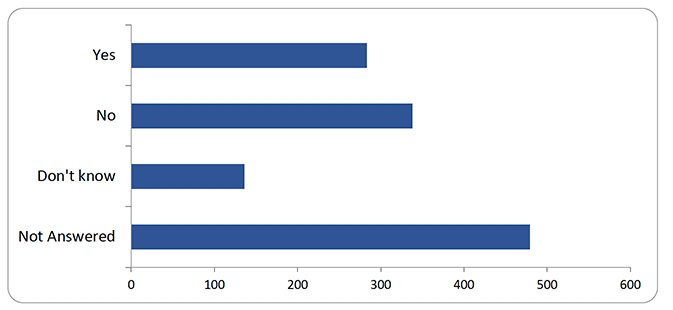
| Option | Total | Percent |
|---|---|---|
| Yes | 283 | 22.90% |
| No | 338 | 27.35% |
| Don't know | 136 | 11.00% |
| Not Answered | 479 | 38.75% |
Question 9 – Do you agree with the proposal to introduce an account upgrade fee?
There were 750 responses to this question.
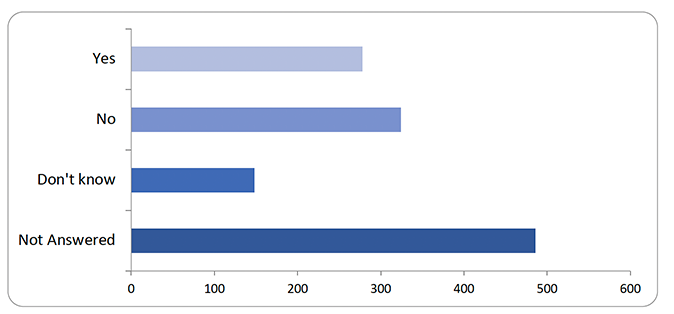
| Option | Total | Percent |
|---|---|---|
| Yes | 278 | 22.49% |
| No | 324 | 26.21% |
| Don't know | 148 | 11.97% |
| Not Answered | 486 | 39.32% |
Question 10 – What information do you think we need to consider in relation to the accredited body registration fee?
There were 522 responses to this question. However, few provided detailed comments.
Analysts noted that there was a level of misunderstanding around this question. Sixty-five of those who responded ‘No’ stated under Question 10 that they were talking about fees for individual volunteers in Qualifying Voluntary Organisations. It is not possible to assess the overall level of misunderstanding to Question 8 and 9. These responses are not discussed in the qualitative analysis below but have been considered as part of analysis of the proposal in relation to the fee discounting for volunteers.
Though responses to Question 8 indicated overall opposition, responses from many organisations identified as currently registered with Disclosure Scotland did acknowledge that there had not been an increase in fees for a number of years and there was understanding of a need for an inflationary rise.
That said, there were some organisations that agreed that while an increase was required the level was too high.
A Day Centre responded noting that:
I'm unsure about this issue. Some accredited bodies will be larger than others and able to absorb these costs. Smaller groups, such as charities, who need to be accredited will struggle with these cost increases.
A number of business respondents, both supportive and unsupportive, noted that gradually increasing our fees over a number of years previously would have been preferable to making a significant increase in a single year.
Another common theme in the consultation responses was whether consideration could be given to differing fees for registering if:
- a small business
- a charity or other business with positive community impact
- a qualifying voluntary organisation
- an umbrella body (an organisation signing on behalf of other organisations)
- an organisation that submits higher numbers of applications
Reed Specialist Recruitment expressed support for the changes to accredited body charging but added that, at the point of formal consultation:
Consultation with the private sector feels light, with assumptions made about the impact on the private sector rather than evidence provided to back this up. There could be impacts not yet realised for SME [small and medium sized enterprises] businesses which should be considered.
No new themes emerged against the previous consultation on this topic in 2018.
Partial Impact Assessments
Question 11 – What information do we need to consider for the Business and Regulatory Impact Assessment?
There were 374 responses to this question.
Not all respondents provided information but those who did so have been incorporated into the impact assessments for further policy development. Impact assessments are expected to be published in February 2025 as part of the parliamentary process.
Question 12 – What information do we need to consider for the Equality Impact Assessment?
There were 354 responses to this question.
Not all respondents provided information but those who did so have been incorporated into the impact assessments for further policy development. Impact assessments are expected to be published in February 2025 as part of the parliamentary process.
Question 13 – What information do we need to consider for the Fairer Scotland Duty Assessment?
There were 328 responses to this question.
Not all respondents provided information but those who did so have been incorporated into the impact assessments for further policy development. Impact assessments are expected to be published in February 2025 as part of the parliamentary process.
Question 14 – What information do we need to consider for the Children’s Rights and Wellbeing Impact Assessment?
There were 348 responses to this question.
Not all respondents provided information but those who did so have been incorporated into the impact assessments for further policy development. Impact assessments are expected to be published in February 2025 as part of the parliamentary process.
Question 15 - What information do we need to consider for the Island Communities Impact Assessment?
There were 303 responses to this question. Eight identified themselves as coming from an island community.
Not all respondents provided information but those who did so have been incorporated into the impact assessments for further policy development. Impact assessments are expected to be published in February 2025 as part of the parliamentary process.
Contact
There is a problem
Thanks for your feedback